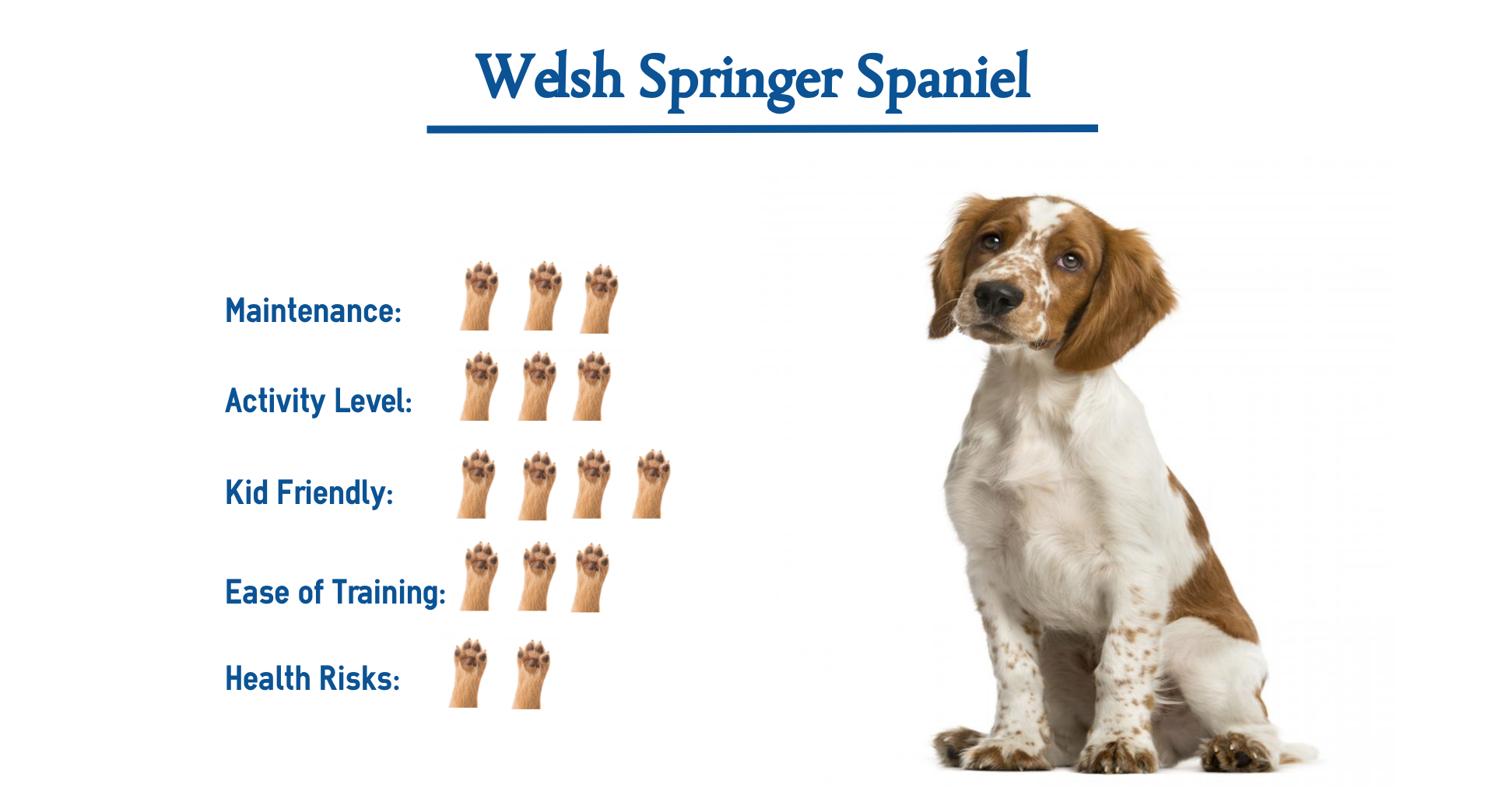Have you ever seen Welsh Springer Spaniel Puppies sleeping together? If so, you might have wanted to scoop them up and take them home. We admit the Welsh Springer Spaniel dog breed is an excellent choice for some…but like all dog breeds, they’re not suitable for everyone. Before you dive into a lifelong role as a fur parent to a Welshie, read this.
Welsh Springer Spaniel Fast Facts
Country of Origin: Spain
Original Purpose: Bird flushing and retrieval
Height: 17 to 20 inches at the shoulder
Weight: 30 to 60 pounds
Lifespan: 11-16 years
Dog Breed Category: Sporting
Origin of the Welsh Springer Spaniel
The Welsh Springer Spaniel is a dog from Spain (get it – Spaniel?). This dog breed shares its beginnings with many other dogs, such as Welsh Springers, Cocker Spaniels, and the English Springer Spaniel. You can see a land spaniel in Renaissance art which resembles the Welsh Springer Spaniel, so there is a good chance they share the same bloodline.
And while these…
Dogs were originally hunters; they turned into show dogs in the 1800s. That said, however, they didn’t gain all that much attention until the Welsh Springer Spaniel Club was established in 1902. This was when the British Kennel Club distinguished the Welsh Springer Spaniel from the English Springer Spaniel. The dog’s name was the Welsh Cocker, later the Welsh Springer Spaniel. The American Kennel Club also recognizes this dog.
This dog got its club in 1961 when the Welsh Springer Spaniel Club of America was founded.
Physical Characteristics
This dog has straight and soft coats that are usually white and dark. The dark could be brown or a rich red color. Red and white Welshies are common. The fur on their legs is feathering and a bit wispy. They also have longish, floppy ears that are super cute.
We should also…
Mention that the hair on their ears is a bit longer and often slightly wavy. They have short and stubby tails. These dogs have long muzzles and those very puppy-dog eyes that are hard to say no to. We’re trying to say that the Welsh Springer Spaniel is a show dog for a reason – they’re beautiful in a puppy way.
Personality and Temperament
This dog loves his family and is a great companion. He lives to people please (which, for some people, can wind up being quite annoying!). He loves being with people, so separation anxiety can be problematic, especially if you’re not home often. So if you like a loveable puppy, this one is for you. Like many dogs, he can get hesitant around strangers and could bark when they approach. However, you can train your dog to read your body cues, so this helps more than it is a problem.
Exercise
This dog needs daily exercise but can still live comfortably in an apartment and doesn’t like to stay outside alone all day. He loves to look at birds and might even chase some if given the chance. That’s just his natural hunting tendency to sneak out.
Potential Health Issues
Like English Springer Spaniels and similar dogs, the Welsh Springer Spaniel is predisposed to some inherent issues. However, if appropriately bred by a respectable breeder, you can find a healthy pup. The way to do this is to go with a breeder recommended by AKC or the Welsh Springer Spaniel Kennel Club. This significantly ups your chances of a healthy dog. However, even with the best breeders, you cannot eliminate the risks of a dog having a congenital disease or acquiring a sickness. Here are some things your dog might experience:
- Hip Dysplasia; (common among many breeds of dogs)
- Epilepsy; can be treated with ongoing medication.
- Ear Infections; those long ears are adorable but also prone to infection
- Entropion; disorder of the eyelid which may or may not require corrective surgery to enhance the dog’s quality of life.
And while many of these conditions may not be life-threatening, they can become quite expensive, particularly if they become recurring issues. This is why we here at IndulgeYourPet also recommend that any new pet owner take a moment and see what it might cost for you to purchase a pet insurance policy for your new animal.
Now will a pet insurance policy be suitable for everyone?
No, probably not. But until you fully understand what these policies “will” and “won’t” cover and how much these pet insurance policies cost, how will you know if one might be right for you?
For more information on who we feel currently offers the “best” pet insurance policies out there, we would encourage you to check out our Best Pet Insurance Policies article.



